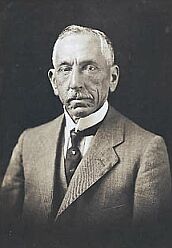William Morris Hughes
|
The Right Honourable William Hughes CH QC |
|
|---|---|
 |
|
|
7th Prime Minister of Australia Elections: 1917, 1919, 1922 |
|
|
In office 27 October 1915 – 9 February 1923 |
|
| Monarch | George V |
| Governor-General |
Sir Ronald Munro Ferguson Lord Forster |
| Deputy |
George Pearce 1915–1916 Sir Joseph Cook 1916–1921 Stanley Bruce 1921–1923 |
| Preceded by | Andrew Fisher |
| Succeeded by | Stanley Bruce |
| Leader of the United Australia Party | |
|
In office 29 August 1941 – 23 September 1943 |
|
| Preceded by | Robert Menzies |
| Succeeded by | Robert Menzies |
| Leader of the Australian Party | |
|
In office 1930–1931 |
|
| Preceded by | Position Established |
| Succeeded by | Joseph Lyons (as Leader of the United Australia Party) |
| Leader of the Nationalist Party | |
|
In office 17 February 1917 – 9 February 1923 |
|
| Deputy | Sir Joseph Cook |
| Preceded by | Himself (as Leader of the National Labor Party) |
| Succeeded by | Stanley Bruce |
| Leader of the National Labor Party | |
|
In office 14 November 1916 – 17 February 1917 |
|
| Deputy | George Pearce |
| Preceded by | Himself (as Leader of the Labor Party) |
| Succeeded by | Himself (as Leader of the Nationalist Party) |
| Leader of the Labor Party | |
|
In office 27 October 1915 – 14 November 1916 |
|
| Deputy | George Pearce |
| Preceded by | Andrew Fisher |
| Succeeded by | Frank Tudor |
| Deputy Leader of the Labor Party | |
|
In office 30 July 1914 – 27 October 1915 |
|
| Leader | Andrew Fisher |
| Preceded by | Gregor McGregor |
| Succeeded by | George Pearce |
| Member of the Australian Parliament for Bradfield | |
|
In office 10 December 1949 – 28 October 1952 |
|
| Preceded by | Seat Created |
| Succeeded by | Harry Turner |
| Member of the Australian Parliament for North Sydney | |
|
In office 16 December 1922 – 10 December 1949 |
|
| Preceded by | Granville Ryrie |
| Succeeded by | William Jack |
| Member of the Australian Parliament for Bendigo | |
|
In office 5 May 1917 – 16 December 1922 |
|
| Preceded by | Alfred Hampson |
| Succeeded by | Geoffry Hurry |
| Member of the Australian Parliament for West Sydney | |
|
In office 29 March 1901 – 5 May 1917 |
|
| Preceded by | Seat Created |
| Succeeded by | Con Wallace |
| Member of the New South Wales Parliament for Sydney-Lang | |
|
In office 17 July 1894 – 11 June 1901 |
|
| Preceded by | New district |
| Succeeded by | John Power |
| Personal details | |
| Born | 25 September 1862 Pimlico, London, England |
| Died | 28 October 1952 (aged 90) Sydney, New South Wales, Australia |
| Resting place | Macquarie Park Cemetery and Crematorium |
| Political party |
Labor (1894–1916) National Labor (1916–17) Nationalist (1917–30) Australian (1930–31) United Australia (1931–44) Liberal (1944–52) |
| Spouse(s) | Dame Mary Ethel Hughes (née Campbell) |
| Children | 7 |
| Religion | Baptist |
William Morris "Billy" Hughes, CH, QC (25 September 1862 – 28 October 1952) was a British-born Australian politician who was the seventh Prime Minister of Australia, from 1915 to 1923.
Born and raised in London, Hughes was the son of Welsh parents. At age 22, he immigrated to Australia and entered into politics. Over the course of his 51-year federal parliamentary career (and an additional seven years prior to that in a colonial parliament), Hughes changed parties five times: from Labor (1894–1916) to National Labor (1916–17) to Nationalist (1917–30) to Australian (1930–31) to United Australia (1931–44) to Liberal (1944–52). He was expelled from three parties, and represented four different electorates in two states.
Originally Prime Minister as leader of the Labor Party, his support of World War I conscription in Australia led him, along with 24 other pro-conscription members, to form National Labor. National Labor merged with the Commonwealth Liberal Party to form the Nationalist Party. His prime ministership came to an end when the Nationalist party was forced to form a coalition with the Country Party, who refused to serve under Hughes. He was the longest-serving prime minister up to that point, and the fifth longest serving over all. He would later lead the United Australia Party to the 1943 election, though Arthur Fadden served as Coalition leader.
He died in 1952 at age 90, while still serving in Parliament. He is the longest-serving member of the Australian Parliament, and one of the most colourful and controversial figures in Australian political history.
...
Wikipedia
